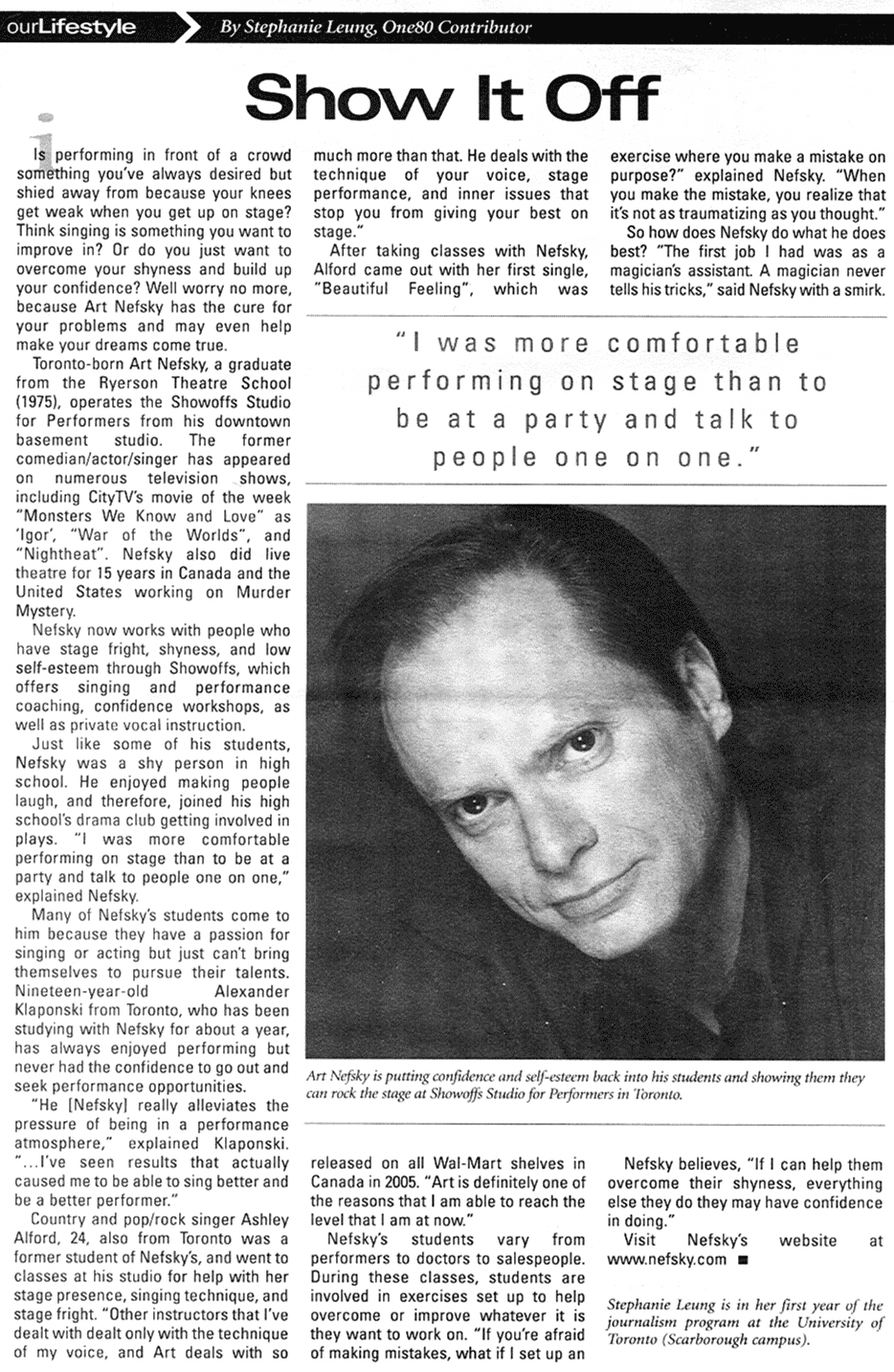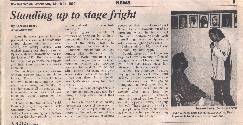Media
Television Appearances and Media Articles
Over the past 36 years, Art Nefsky and Showoffs Studio have been featured in numerous newspaper and magazine articles, as well as on various TV and radio talk shows.
TV on Showoffs
More To Life, TV OntarioArticles on Showoffs
Show It Off, One80 Newspaper
“Standing Up To Stage Fright”, The Ryersonian
 Even the shyest person has the potential to become a show-off after a few classes with performance coach, Art Nefsky. Nefsky, who studied theatre for three years at Ryerson, started Showoffs Studio for shy folk in 1987. He aims to help free people of performance anxiety and help them capture a crowd’s attention.
Even the shyest person has the potential to become a show-off after a few classes with performance coach, Art Nefsky. Nefsky, who studied theatre for three years at Ryerson, started Showoffs Studio for shy folk in 1987. He aims to help free people of performance anxiety and help them capture a crowd’s attention.
He has helped people perform without sweaty palms or shaky knees, “this isn’t the 10 or 12 steps of how to overcome shyness or how not to be nervous,” said Nefsky. “I just chip away at all the excuses that have made you nervous until you have no other reason to be nervous.”
“I was so nervous at first,” said Fenulla Jiwani, a 22-year-old York University student. “But all of a sudden I was engaging each person and after the show people came up to me and said that was truly amazing.”
Nefsky gives a variety of exercises to bring out his students’ personalities. He has them sing in front of the class. Then he concentrates on vocal technique.
Students concentrate on eye contact with individuals in the audience, body movement and then copy the gestures of audience members. Nefsky also provides personas for students to act out while singing — for example, a diva-superstar-bitch who has bad gas.
“It’s not about being vocally correct, it’s about having fun,” said Jiwani.
Nefsky has years of experience in the entertainment field and now he’s trying to help others fulfill their dreams.
“I had a television series hosting the monster movie of the week on CityTV. I had a night club act for years and all of a sudden I got this kick out of helping people get their own dream,” said Nefsky. He runs Showoffs Studio out of his basement, which he transformed into a cozy performing studio with a small stage, sound equipment, a video camera, lighting and seats.
Barbara Macel, 18, belted out “Criminal,” by Fiona Apple.
“I could never do that before on stage and now I can sing in front of strangers instead of friends and family.” After five classes, Macel has advanced to the second level.
“When I see someone is ready, they go on to level two,” said Nefsky. “It’s hell because you have to do whatever I say. We can be outrageous in level two. People dress up in costumes. We had a woman who came from the corporate world just for shyness, and she dressed up like Cher and started bopping away, singing ‘Believe’.” These classes are not just for people who want to be singers or actors. Nefsky has coached people as young as three and as old as 71.
“Finding My Voice”, Harlen Wall
I can’t sing. I simply can’t. Never could. Not even in the shower. As a child, I was kicked out of the school choir and told never to come back.
Now that I’m an adult, I think it’s time to prove my choir teacher wrong. Along with the myriad naysayers who believe my vocal cords are dubious at best. The thought of being another vocally challenged male, relegated to humming along to his favourite song on the radio, is too much for me to bear. I want more.
I want to sing in the car. At the table. In the park. The way I used to when I was too young to care how I sounded. I want to feel the freedom of belting out a song from the pit of my stomach. I want to sing to my girlfriend in bed. I want to stand tall on karaoke night and regale my friends.
I want to find my voice.
Enter: Showoffs Studio for Performers. The director, Art Nefsky, claims he can teach anyone how to sing. It’s not just a claim. It’s a promise. Nefsky has been teaching people how to sing for 15 years, combining his unique personality with a well-crafted technique rooted in improvisational comedy. His office is located in his home at Eglinton and the Allen Road.
I quickly register for a set of four classes.
At the first class, I have no idea what to expect. A cadre of people, young and old, is gathered in a modest basement studio, replete with three microphones, a keyboard, and two large speakers. Nefsky mounts the stage with the presence of a Borscht Belt comedian, and within seconds we’re all laughing and having a good time.
I find out that some participants, unlike myself, are not interested in learning how to sing. They’re interested in becoming better performers and better communicators. They believe they can grow through the art of song. It makes perfect sense to me.
One woman is a CEO of a major corporation. She wants to be more effective when giving oral presentations. One man is an actor, looking for more stage presence. Others have never performed in front of a group of people and merely wish to rise above inhibitions.
“Everyone can sing “, Nefsky tells us. “It’s just a question of removing the blocks and giving yourself permission to make mistakes.”
After a spirited introduction, it’s time to begin. My armpits start leaking like an unruly faucet. I offer to go first and get it over with. My chosen song is “Hello Again”, by Neil Diamond. It’s one that I can relate to. It’s always been my favourite.
I stand up on the stage and before I start, Nefsky informs me that he will not stop the music if I make a mistake. Not once. Even if I forget all the words. Whether I hum or whistle or just sigh loudly, I have to make it to the end on my own. It’s lesson number one: have the courage to look an audience in the eye and say “This is the best I can do. “
I begin to sing.
The words barely come out. They feel like clumps of mortar stuck to my throat. But when the song ends I feel satisfied. Liberated. It’s the type of liberation that can only come from rising above a lifelong fear. I know that if I can get up and sing in front of a group of strangers, I can do almost anything in life.
My teacher instructs me to sing it again. Only this time he gives me an exercise. I have to make eye contact with every audience member. For fifteen seconds, consecutively, before moving on to the next. “The song isn’t important at this point. I want you to keep looking at people, and don’t look away,” says Nefsky.
I sing the same song, a second time, following instructions. I feel more vulnerable. Exposed. Naked. It’s difficult but I like the feeling. I feel like I’m connecting with each person. Surprisingly, my voice sounds much better. More authentic. And I even manage to hit some of the high notes, which is a bonus.
“Lesson number two,” says Nefsky. “Make a connection with your audience and reach out with your eyes. You really don’t need to hit all the notes. People just want to have a good time and feel valued.”
Class Two. Nefsky sits in front of me on a chair, as I sing my song. He pretends to be a little kid with a short attention span, manic gestures and silly facial contortions. My job, I”m told, is to do whatever it takes to hold his interest.
My next exercise is quite different. I have to pretend to be a politician, shaking hands with every member of the audience and telling them all to vote for me. While I sing of course.
During the third class, Nefsky has me singing in gibberish, pretending to be a drunken lounge singer, and to make things really interesting, I’m told to sing “Hello Again” as Elvis Presley. The same words. The same song. Only this time, I have to give my best Elvis impersonation. The results are hilarious and the exercise forces me to have fun. Lesson number three: if you have a good time singing, the audience will as well.
The final class arrives. There is no exam. No term paper. Only a performance followed by a short oral presentation. As I sing “Hello Again,” one last time, it becomes obvious to everyone,including me, that I can actually sing and carry a tune. In just four short classes I have done what many said was impossible. I have found my voice. And I like what I’ve found. Lesson number four: choir teachers are always wrong. No, that’s not it.
Everyone can sing.
